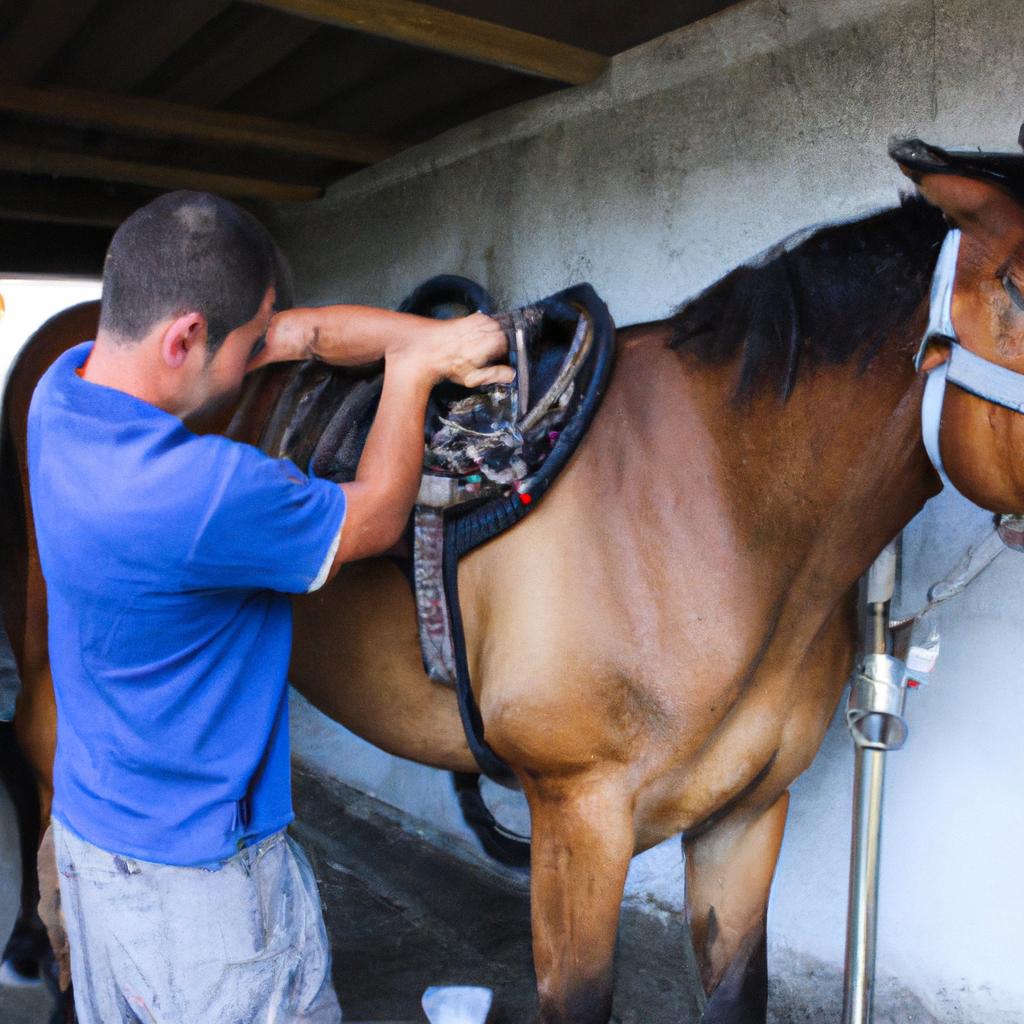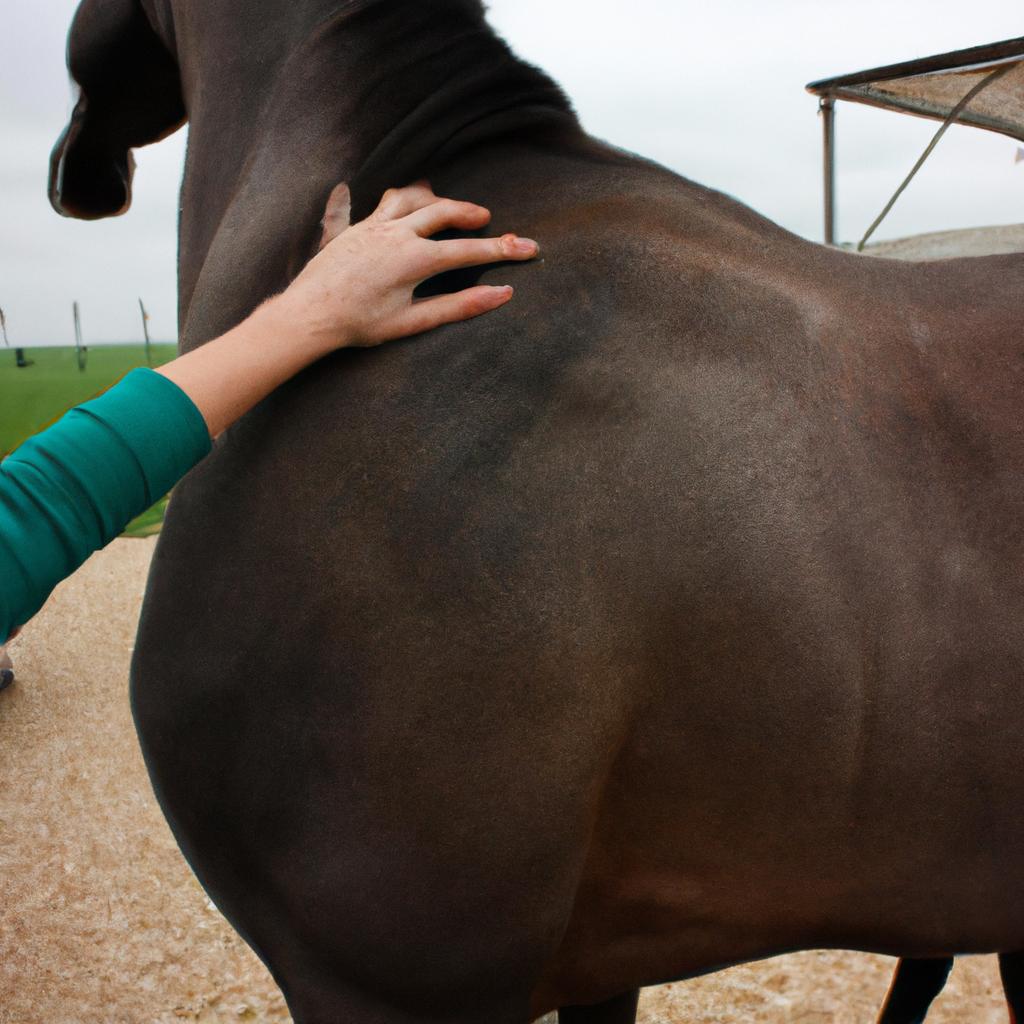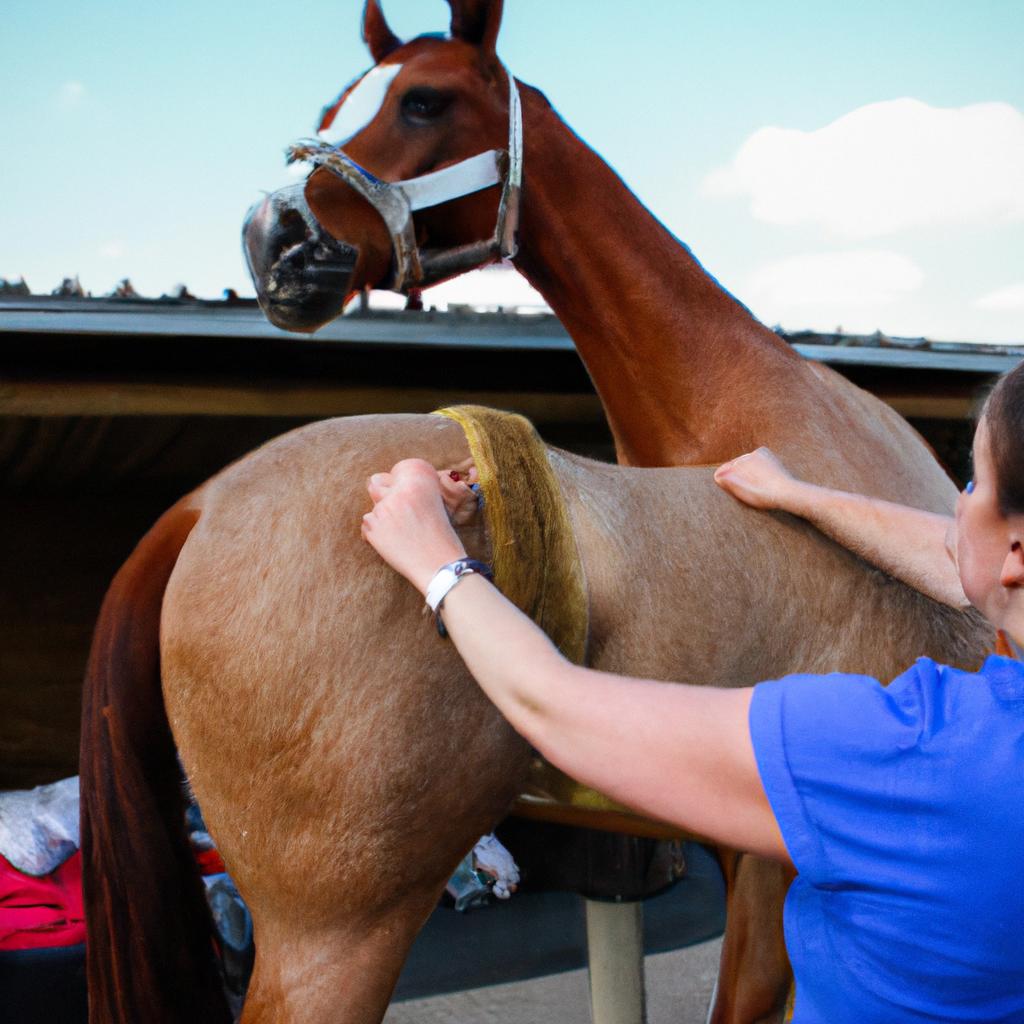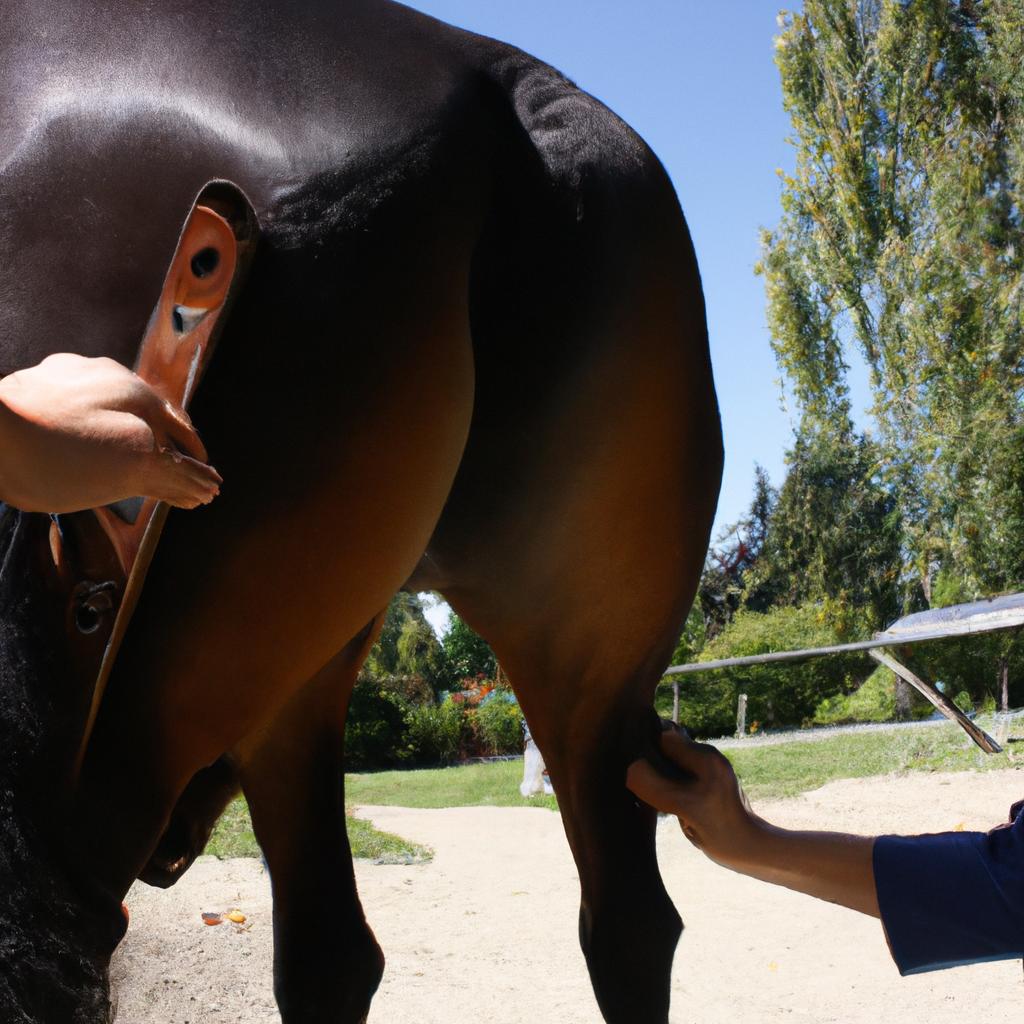The cost of equine chiropractic treatments has become a topic of interest for horse owners and enthusiasts alike. With the increasing popularity and recognition of alternative therapies in veterinary medicine, such as chiropractic care, it is important to understand the financial implications associated with these treatments. For instance, consider a hypothetical scenario where a competitive show jumper experiences decreased performance due to musculoskeletal issues. In an attempt to address the underlying problem, the owner seeks out the services of an equine chiropractor. However, they are faced with the challenge of finding a qualified practitioner who can provide effective treatment at a reasonable cost.
Finding a qualified equine chiropractor is paramount when considering the cost-effectiveness of these treatments. Equine chiropractors undergo specific training and certification programs that enable them to diagnose and treat various musculoskeletal conditions in horses. It is essential to ensure that practitioners possess appropriate qualifications from accredited institutions or professional organizations specializing in animal chiropractic care. Moreover, verifying their experience and track record by seeking references or consulting other horse owners who have previously utilized their services can help gauge the expertise and effectiveness of potential candidates. By prioritizing quality over cost alone, horse owners can make informed decisions about choosing an equine chiropractor who offers reliable treatment without breaking the bank.
Understanding the benefits of equine chiropractic treatments
Understanding the Benefits of Equine Chiropractic Treatments
Equine chiropractic treatments have gained popularity in recent years as a non-invasive and holistic approach to maintaining the health and well-being of horses. By focusing on spinal alignment and nervous system function, these treatments aim to alleviate pain, improve performance, and enhance overall horse welfare. To illustrate the potential benefits, consider a hypothetical case study involving a competitive show jumper named Bella.
Bella is a nine-year-old mare who has been experiencing difficulty during jumps, often knocking down poles or refusing certain obstacles altogether. After several veterinary assessments ruled out any underlying physical injuries or lameness issues, Bella’s owner sought the help of an equine chiropractor. Through a series of gentle adjustments aimed at correcting misalignments in Bella’s spine, her range of motion improved significantly. As a result, Bella regained confidence and began performing exceptionally well in competitions once again.
There are several key benefits associated with equine chiropractic treatments that may contribute to cases like Bella’s:
- Pain relief: Misalignments in the spine can cause discomfort and restrict mobility for horses. By realigning the vertebrae through chiropractic adjustments, pain can be alleviated and freedom of movement restored.
- Improved performance: When horses experience pain or restricted movement due to spinal misalignments, their performance in various disciplines such as racing, jumping, or dressage may be compromised. Correcting these misalignments allows horses to move more freely and perform at their full potential.
- Enhanced recovery: In cases where horses have undergone surgery or sustained injuries requiring rehabilitation, equine chiropractic care can complement traditional veterinary treatments by promoting faster healing and aiding in the restoration of normal biomechanics.
- Overall wellness: Maintaining proper spinal alignment not only addresses specific issues but also contributes to general horse welfare. A healthy spine ensures optimal nerve function throughout the body, supporting organ systems and overall vitality.
To visually depict the potential benefits, consider the following table:
| Benefit | Description |
|---|---|
| Pain relief | Alleviates discomfort and restrictions caused by spinal misalignments |
| Improved performance | Enhances horses’ abilities in various disciplines by restoring freedom of movement |
| Enhanced recovery | Complements traditional veterinary treatments by promoting faster healing and aiding in the restoration of normal biomechanics |
| Overall wellness | Supports optimal nerve function throughout the body, contributing to organ system health and overall vitality |
By understanding these benefits, horse owners can make informed decisions about seeking equine chiropractic care for their animals. In the subsequent section, we will explore how to evaluate the cost-effectiveness of such treatments without compromising your horse’s well-being. Transitioning into this topic, it is important to consider both the advantages and financial considerations associated with equine chiropractic care.
Evaluating the cost-effectiveness of equine chiropractic care
Understanding the benefits of equine chiropractic treatments has led many horse owners to consider this alternative therapy for their animals. However, before embarking on such a treatment plan, it is essential to evaluate the cost-effectiveness and find a qualified equine chiropractor. To shed light on these aspects, let’s explore the potential costs associated with equine chiropractic care.
To illustrate the financial implications, let’s consider an example involving a competitive show jumper named Bella. Bella experienced stiffness and reduced performance due to musculoskeletal issues. Her owner decided to seek equine chiropractic treatment as part of her rehabilitation program. Over several sessions, Bella received spinal adjustments and soft tissue therapies from a certified equine chiropractor.
When evaluating the cost-effectiveness of equine chiropractic care, there are several points worth considering:
- Treatment frequency: The number of sessions required will depend on various factors such as the severity of the condition and individual response to treatment.
- Additional expenses: In some cases, supplementary treatments like acupuncture or massage therapy might be recommended alongside chiropractic care.
- Travel costs: Depending on your location and availability of local practitioners, you may need to account for travel expenses when visiting a qualified equine chiropractor.
- Insurance coverage: It is worthwhile to check if your insurance policy covers equine chiropractic treatments, as this can significantly impact overall costs.
| Factors Affecting Cost | Potential Costs |
|---|---|
| Number of Sessions | $300 – $600 per session |
| Supplementary Treatments | $50 – $150 per session |
| Average Travel Expenses | Varies based on distance |
| Insurance Coverage | Fully covered or partial reimbursement |
Considering these factors and costs associated with equine chiropractic treatments allows horse owners to make informed decisions regarding their budgetary allocation for their horse’s healthcare needs.
Transitioning into the subsequent section on “Factors to consider when choosing an equine chiropractor,” it is important to address certain aspects before making a decision. By evaluating these factors, you can ensure that your chosen practitioner is suited to provide effective and safe treatment for your horse’s specific condition.
Factors to consider when choosing an equine chiropractor
Evaluating the cost-effectiveness of equine chiropractic care is an important aspect to consider when seeking treatment for your horse. By understanding the potential costs involved and assessing whether it aligns with the expected benefits, you can make informed decisions about pursuing this form of therapy.
To illustrate this point, let’s consider a hypothetical case study involving a competitive show jumper named Bella. Over time, Bella started displaying signs of stiffness and decreased performance. Her owner decided to explore equine chiropractic treatments as a possible solution. After several sessions with a qualified equine chiropractor, Bella showed significant improvement in her flexibility and performance, ultimately leading to better results in competitions.
When evaluating the cost-effectiveness of equine chiropractic care, there are several factors to take into consideration:
- Initial consultation fees: Equine chiropractors usually charge an initial fee for assessment and evaluation purposes.
- Treatment session costs: Each subsequent treatment session may have its own associated cost.
- Frequency of treatments: Depending on the severity of the condition or goals of treatment, multiple sessions might be required over a specific period.
- Additional expenses: This may include travel expenses if the chosen equine chiropractor is located far from your stable or any other related costs like X-rays or diagnostic tests.
To provide a visual representation of these considerations, here is a table outlining some potential costs associated with equine chiropractic care:
| Cost Category | Estimated Amount |
|---|---|
| Initial Consultation | $100-$200 |
| Treatment Sessions | $75-$150 |
| Frequency | Varies |
| Additional Expenses | Varies |
By considering all these factors together, you can assess the overall affordability and value that equine chiropractic care offers for your horse’s well-being and athletic performance.
Transitioning into our next section discussing “Comparing prices and services offered by different equine chiropractors,” it is important to note that evaluating the cost-effectiveness of equine chiropractic care goes hand in hand with understanding the range of prices and services available. By comparing different options, you can make an informed decision that best suits your horse’s needs without compromising on quality or effectiveness.
Comparing prices and services offered by different equine chiropractors
In the previous section, we discussed various factors that should be taken into consideration when selecting an equine chiropractor. Now, let us delve deeper into one of these factors – the cost of equine chiropractic treatments. To illustrate this point, let’s imagine a scenario where a horse owner is searching for a qualified equine chiropractor to treat their horse’s back pain.
One important aspect to consider in terms of cost is the frequency and duration of treatment sessions required. For instance, if our hypothetical horse owner finds two potential chiropractors who charge differently for their services, but one recommends only three sessions while the other suggests six sessions over the same time period, it becomes essential to analyze whether the lower-priced option truly provides better value or if it simply means more frequent visits and potentially higher overall costs.
To further aid in assessing the financial implications of different options, here are some key considerations:
- Initial consultation fees: Some practitioners may offer free initial consultations, while others may charge a fee upfront.
- Treatment session charges: Different chiropractors may have varying rates per session based on their level of expertise and experience.
- Additional expenses: It is crucial to inquire about any supplementary costs associated with treatments such as diagnostic tests or specialized equipment usage.
- Insurance coverage: Checking if your insurance policy covers equine chiropractic treatments can significantly impact your decision-making process.
Now let us turn our attention towards comparing prices and services offered by different equine chiropractors. In order to facilitate this comparison effectively, below is a table showcasing four potential candidates along with details about their pricing structure and services provided:
| Chiropractor | Initial Consultation Fee | Session Charge | Additional Expenses |
|---|---|---|---|
| Dr. Smith | $50 | $100 | None |
| Dr. Johnson | $75 | $85 | $25 for X-rays |
| Dr. Brown | Free | $120 | $50 if specialized equipment used |
| Dr. Wilson | $60 | $95 | None |
By comparing these details, it becomes apparent that while some chiropractors may have higher session charges, they offset this by not charging additional fees for diagnostic tests or specialized equipment usage.
In summary, when considering the cost of equine chiropractic treatments, it is crucial to assess factors beyond just the initial price. The number and duration of treatment sessions required play a significant role in determining the overall value provided by different practitioners. By carefully evaluating various aspects such as consultation fees, session charges, additional expenses, and insurance coverage, horse owners can make informed decisions regarding their choice of an equine chiropractor.
Moving forward, let us explore essential tips for ensuring the qualifications and expertise of an equine chiropractor.
Tips for ensuring the qualifications and expertise of an equine chiropractor
Comparing prices and services offered by different equine chiropractors
To illustrate the importance of comparing prices and services offered by different equine chiropractors, let’s consider a hypothetical scenario. Imagine you are a horse owner with a mare named Bella who has been experiencing stiffness and discomfort in her back. You decide to explore equine chiropractic treatments as a potential solution to alleviate Bella’s symptoms.
When researching various equine chiropractors, it is crucial to evaluate not only their pricing but also the range of services they offer. Here are some key considerations to keep in mind:
-
Treatment Techniques: Different practitioners may employ varying techniques during their sessions. For example, while one chiropractor may focus solely on manual spinal adjustments, another may incorporate additional modalities such as massage therapy or acupuncture. Understanding these differences can help you make an informed decision based on your horse’s specific needs.
-
Experience and Qualifications: The expertise and qualifications of an equine chiropractor play a significant role in ensuring effective treatment for your horse. Look for professionals who have undergone comprehensive training from reputable institutions specializing in animal chiropractic care. Additionally, inquire about their years of experience working specifically with horses to gauge their level of familiarity with equine musculoskeletal issues.
-
Client Feedback: Reading reviews or testimonials from other horse owners can provide valuable insights into the experiences they had with different chiropractors. Pay attention to feedback regarding the effectiveness of treatments, overall satisfaction levels, and any potential concerns raised.
-
Costs: Equine chiropractic treatments can vary significantly in terms of pricing structure and frequency required for optimal results. While it is important to find a practitioner within your budget, be cautious about basing your decision solely on cost without considering the quality of service provided.
In order to further understand how costs can differ among equine chiropractors, refer to the table below that compares four hypothetical providers:
| Chiropractor | Initial Consultation Fee | Subsequent Session Fee |
|---|---|---|
| Dr. Smith | $150 | $100 |
| Dr. Johnson | $200 | $90 |
| Dr. Thompson | $175 | $120 |
| Dr. Brown | $250 | $80 |
As you can see, the initial consultation fees range from $150 to $250, while subsequent session fees vary between $80 and $120.
In summary, when looking for an equine chiropractor, it is essential to compare prices and services offered by different practitioners. Consider factors such as treatment techniques, experience and qualifications, client feedback, and costs before making a decision. By doing so, you are more likely to find a qualified professional who can provide optimal care for your horse’s musculoskeletal issues.
Transitioning into the subsequent section about “Exploring alternative therapies and their costs for equine musculoskeletal issues,” it becomes imperative to explore other therapeutic options beyond chiropractic treatments in order to make an informed choice regarding Bella’s well-being.
Exploring alternative therapies and their costs for equine musculoskeletal issues
Tips for finding a qualified equine chiropractor
To ensure the qualifications and expertise of an equine chiropractor, there are several key steps that horse owners can take. For example, consider the case of Sarah, a competitive show jumper whose horse began experiencing stiffness and decreased performance. Concerned about her horse’s well-being, Sarah sought out an equine chiropractor to address these issues.
One important tip is to research the educational background and certification of potential equine chiropractors. A qualified practitioner should have obtained formal training in animal chiropractic from an accredited institution such as the American Veterinary Chiropractic Association (AVCA) or International Veterinary Chiropractic Association (IVCA). Additionally, they should hold proper licensure or registration with relevant regulatory bodies in their jurisdiction.
Another crucial aspect is to seek recommendations from trusted sources within the equestrian community. Horse owners, trainers, and veterinarians who have had positive experiences with specific practitioners can provide valuable insights regarding their competence and effectiveness. Furthermore, it may be beneficial to inquire whether prospective chiropractors have experience working with horses similar in discipline or breed to yours.
When contacting potential equine chiropractors, ask detailed questions about their treatment approach and philosophy. A reputable practitioner will prioritize the overall health and welfare of the horse by conducting thorough examinations before providing any form of treatment. They should also demonstrate a collaborative mindset by actively involving other members of your horse’s healthcare team, such as veterinarians or farriers.
In conclusion,
Finding a qualified equine chiropractor requires careful consideration of factors such as education, certification, recommendations within the equestrian community, and treatment approach. By taking these steps into account when selecting a practitioner like Sarah did for her show jumper’s musculoskeletal issues, horse owners can increase the likelihood of receiving effective care for their beloved animals.
 Eq Muscle Release
Eq Muscle Release



